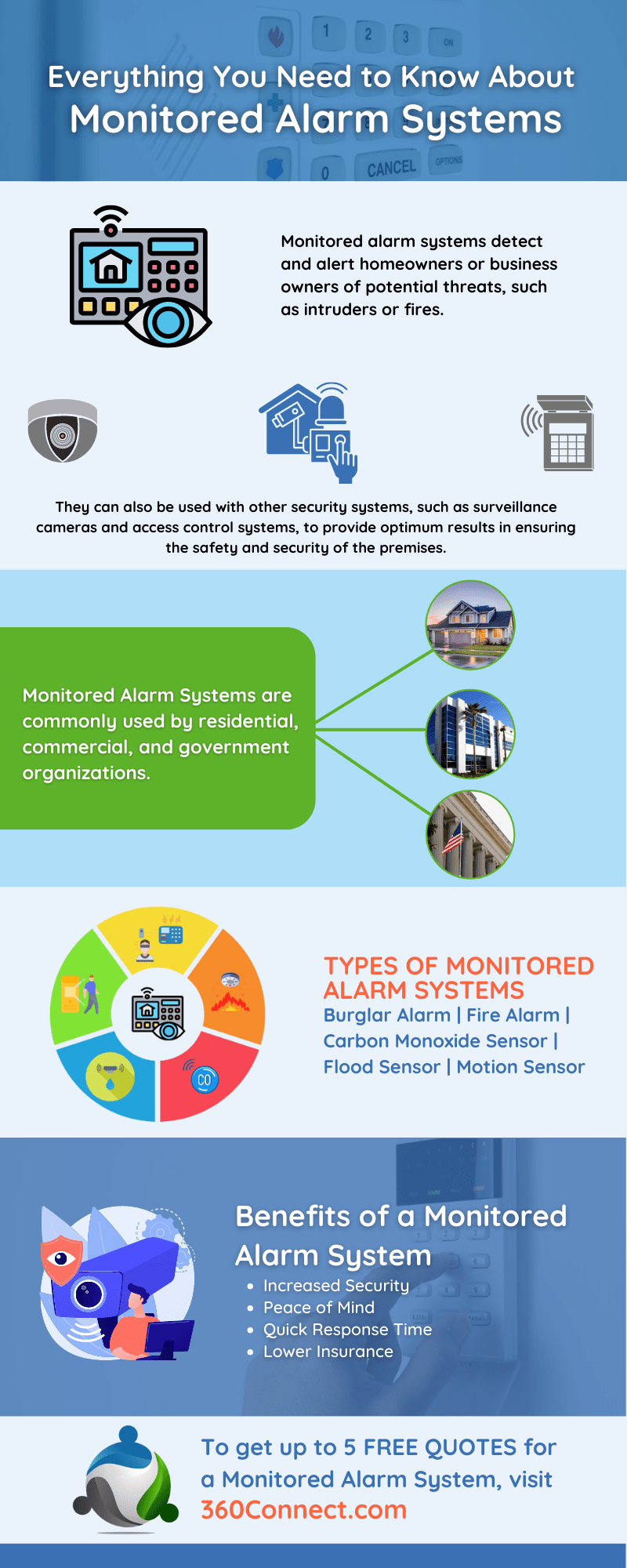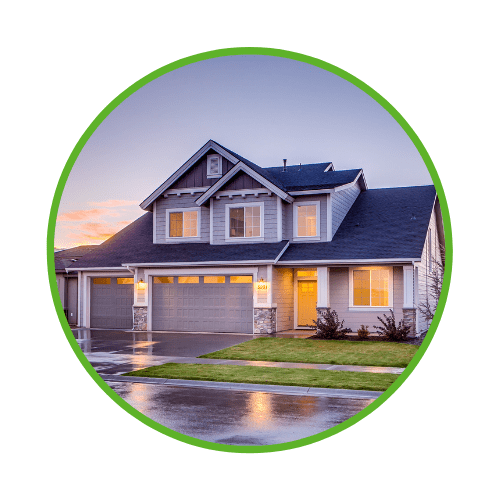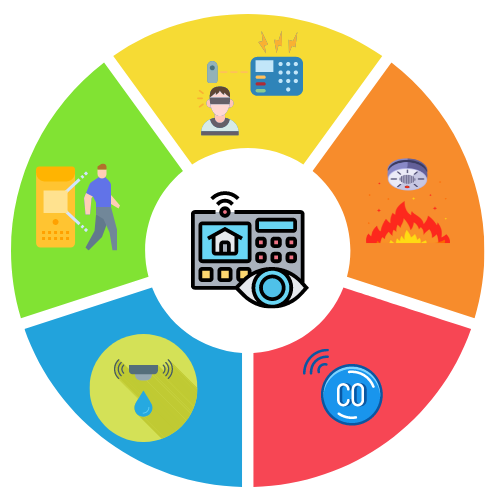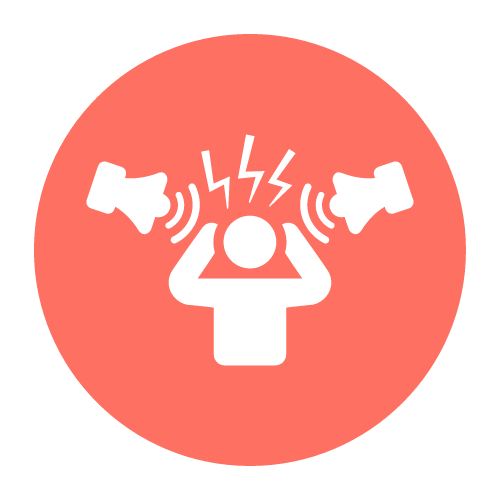Buyer's Guide: Monitored Alarm Systems
GET FREE QUOTESA Monitored Alarm System Buyer's Guide
If you’re in the market for a monitored alarm system, you’re probably aware that there are a lot of options out there. Choosing the right one can be overwhelming. But this guide will help you navigate the features and benefits of monitored alarm systems so that you can make an informed decision.
What is a Monitored Alarm System?
A monitored alarm system is a security system that is connected to a monitoring center. When the alarm is triggered, the monitoring center is alerted and can take action, such as contacting the homeowner, dispatching emergency services, or sending a security guard to the property.
A monitored alarm system is one of the most effective ways to protect your home or business from potential threats. The system works by detecting potential threats, such as break-ins, fires, or floods, and then sending an alert to a professional monitoring service. This monitoring service is staffed by trained professionals who are available 24/7 to respond to any alarms that are activated. They will verify the alarm and, if necessary, contact the appropriate authorities to respond to the emergency.
One of the key benefits of a monitored alarm system is the added layer of security and peace of mind it provides. Knowing that your home or business is being monitored around the clock can help you sleep better at night. And reduce your anxiety levels. Additionally, having a system in place can help to deter potential intruders. As they are more likely to move on to an easier target. Finally, a monitored system can also help to reduce the risk of loss or damage due to burglary, fire, or other emergencies. The quick response time of the monitoring service can mean the difference between a small incident and a major disaster. Overall, a monitored alarm system is an investment in the safety and security of your property and loved ones.
Breakdown of Monitored Alarm Systems
Video surveillance, security system, alarm system, access control…monitored alarm system, what’s the difference?! If this is going through your head, that’s a very valid thing to be confused over. But the answer is quite simple. While each system can operate on its own, a monitored alarm system incorporates each. Monitored alarm systems are an all-in-one solution for home or business security. Because they incorporate different security systems to provide comprehensive protection.
These systems typically consist of the following:
Security Sensors
These are devices that detect intrusions, such as motion detectors, door and window sensors, and glass break detectors. When triggered, they send a signal to the alarm panel, which activates the alarm and alerts the monitoring center.
Alarm Panel
This is the central control unit that manages the security system. It receives signals from the security sensors and activates the alarm when an intrusion is detected.
Communication System
This is the system that connects the alarm panel to the monitoring center. It can use different methods, such as cellular, internet, or landline, to send alarm signals to the monitoring center.
Monitoring Center
This is a remote facility staffed by trained professionals who monitor alarm signals 24/7. When an alarm is triggered, the monitoring center responds by contacting the homeowner or business owner to verify the emergency. And dispatch emergency services if necessary.
Additional Features
Some alarm systems offer additional features, such as video surveillance, smart home integration, and home automation. These features provide added convenience and peace of mind, allowing users to monitor and control their security system remotely.
Combining these different security systems offers a solution that can protect against a wide range of threats. Including burglary, fire, and carbon monoxide poisoning. They provide reliable, round-the-clock monitoring and response, which can be critical in an emergency. Moreover, they can be tailored to the specific needs of the homeowner or business owner. Providing a customized security solution that meets their unique requirements.
So, to be clear. For example, no, a monitored alarm system is technically not a video security system, because it’s not a camera. However, it’s a system that can combine different security systems to provide an optimum solution for a team monitoring your home or business.

Who Uses Monitored Alarm Systems?
Monitored alarm systems are used by a wide range of people and organizations who are concerned with protecting their property and assets. Residential customers, commercial businesses, and government organizations are among the most common users.

Residential
Homeowners may choose to install monitored alarm systems to protect their property, family, and possessions. Homeowners may opt for a burglar alarm system that includes door and window sensors, motion detectors, and a control panel that alerts a monitoring service when the system is triggered. Other types of alarm systems may include fire detection, carbon monoxide detection, and flood detection. Homeowners may also choose to install video surveillance systems. To monitor activity on their property, which can provide an added level of security.

Commercial
Large and small commercial businesses use monitored systems to protect their assets and employees. Retail stores may install burglar alarms to protect against theft. While manufacturing facilities may install fire detection systems to protect against potential fires. Access control systems may limit access to certain areas of the property. At the same time, video surveillance systems can monitor activity.

Government
Government organizations may also use monitored systems to protect public property. Such as government buildings, parks, and other public spaces. These systems may include access control systems, video surveillance systems, and fire detection systems. Among other types of systems.
Types of Monitored Alarm Systems
There are several types of monitored alarm systems available, designed to protect homes and businesses from various types of threats. Here are some of the most common types:

Burglar Alarms: Detects unauthorized entry or access to a building or specific areas within it. They typically use motion sensors, door and window sensors, or glass break detectors to trigger an alarm.
Fire Alarms: Recognize the presence of smoke or heat and alert the occupants of a building to the danger of a potential fire. They can be set up to automatically contact emergency services.
Carbon Monoxide Sensors: Designed to detect dangerous levels of carbon monoxide gas in the air. Carbon monoxide is odorless and can be deadly, so these alarms are essential for preventing poisoning.
Flood Sensors: Identifies water leaks or flooding and alerts the occupants of a building to take action to prevent damage.
Motion Sensors: A motion sensor is a key component of many alarm systems, as it can detect movement and trigger an alert to a monitoring center or directly to the homeowner.
Overall, the best type of monitored alarm system for your home or business will depend on your specific security needs and the sort of property or assets you need to protect. By working with a reputable company, you can get advice on the best type of system for your business and ensure that it is installed and monitored appropriately to provide a maximum level of protection.
Wired vs Wireless Monitored Alarm Systems
When considering a monitored alarm system, one vital decision is choosing a wired or wireless option. Both options have advantages and disadvantages, and the decision ultimately comes down to individual needs and preferences.
Wired-Monitored Alarm System
Wired-monitored alarm systems are hardwired into your home or company’s electrical system, making them typically more reliable and less prone to interference than wireless systems. However, they can be more labor-intensive and may require professional installation.
Wireless Monitored Alarm System
Wireless monitored alarm systems use wireless technology to communicate with the monitoring station and other devices in the system. Although they are typically easier to install and more flexible in terms of placement, they can be more susceptible to interference and signal loss.
Monitored vs Unmonitored Alarm Systems
You may have heard of unmonitored alarm systems. So, what’s the difference between unmonitored and monitored alarm systems?

Monitored
A monitored alarm system is connected to a central monitoring station, where trained professionals can respond to an alarm event 24/7. When an alarm is triggered, the monitoring station is immediately notified, and a security professional will typically attempt to contact the homeowner or business owner to verify if it’s a false alarm. If they can’t reach the owner, they will dispatch emergency responders such as the police or fire department to the location.

Unmonitored
In contrast, an unmonitored alarm system is not connected to a central monitoring station. Instead, when the alarm is triggered, a loud siren or strobe light is activated. Intended to alert anyone nearby to the presence of an intruder. It’s then up to the homeowner, business owner, or a designated person, to take appropriate action, such as calling the police.
Benefits of a Monitored Alarm System
When it comes to ensuring the safety and security of your home or business, there are numerous benefits and positive outcomes that can be achieved by having a reliable and efficient system installed, such as:
Increased Security
Provides an extra layer of security that can help deter burglars and prevent break-ins.
Peace of Mind
Knowing that your property is being monitored 24/7 can give you peace of mind, whether you’re at home or away.
Quick Response Time
If an alarm is triggered, the monitoring center will be alerted immediately, allowing for a quick response time from emergency services.
Lower Insurance Premiums
Many insurance companies offer discounts for properties with a monitored alarm system installed, which can help offset the cost of the system over time.
Features to Look for in a Monitored Alarm System
When selecting a monitored alarm system, it is crucial to consider several important and potentially game-changing features that may make all the difference in providing a comprehensive and effective security solution for your home or business. Some of the main factors to keep in mind when evaluating your options might include:
- 24/7 Monitoring – Make sure the system you choose provides round-the-clock monitoring so you can be confident that your property is always being watched.
- Multiple Communication Channels – Look for a system that can communicate through multiple channels, such as cellular, Wi-Fi, and landline, to ensure that the monitoring center can always be reached.
- Integration with Other Devices – Can be integrated with other devices, such as smart locks and cameras, to provide a more comprehensive security solution.
- User-Friendly Interface – A user-friendly interface can make it easier to set up and use the system, and can reduce the likelihood of false alarms.
- Remote Access – Some systems allow you to access the system remotely, so you can arm or disarm the system, view live video feeds, and receive notifications on your smartphone or tablet.
Choosing the Right Provider
When choosing a monitored alarm system provider, it’s crucial to do your research. Look for a provider that:
- Has a Good Reputation- Check reviews and ratings online to ensure the provider has a good reputation.
- Offers Responsive Customer Service- Make sure you choose a provider that offers responsive customer service, so you can get help quickly.
- Provides Transparent Pricing- Make sure the provider is transparent about their pricing and any additional fees.
- Offers Customizable Packages- Look for a provider that offers customizable packages, so you can choose the features and services that meet your needs.
- Has a Professional Installation Team- A professional installation team can ensure that the system is installed correctly and that you know how to use it.
How Much Does it Cost?
The cost of a system can vary widely depending on several factors. Type of security system, wired, wireless, installation cost, hardware, and more. But, if just focussing on the cost of monitoring, the monthly cost on average for monitored alarm systems is between $25 to $120.
| Residential | $25 – $50 |
| Commercial | $40 to $120 on average |
Conclusion
A monitored alarm system can provide an extra layer of security and peace of mind for your home or business. By considering the features and benefits of different systems, and choosing a reputable provider, you can find a system that meets your needs and budget.
Get a Monitored Alarm System Quote!
At 360Connect, we understand shopping for a monitored alarm system can be complex and we hope to have cleared up some confusion in this buyer’s guide. If a monitored alarm system looks like the right fit for you, we’ll provide you with up to 5 FREE QUOTES from monitored alarm system experts.
- Fill out the Monitored Alarm System Form
- We Share Your Request With Up To 5 Suppliers
- A Local Supplier Will Reach Out to You With A Quote
